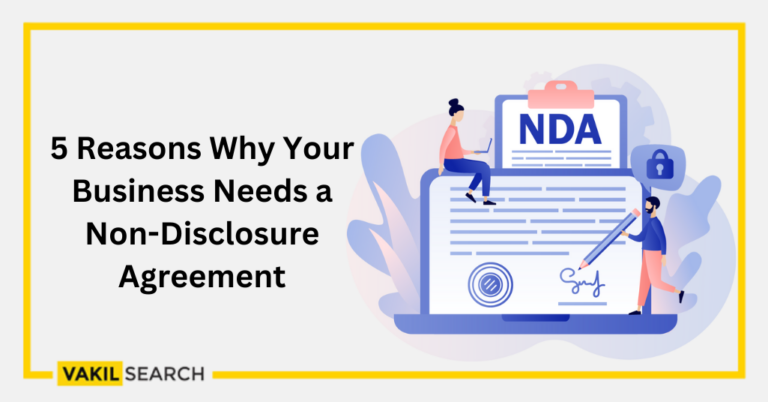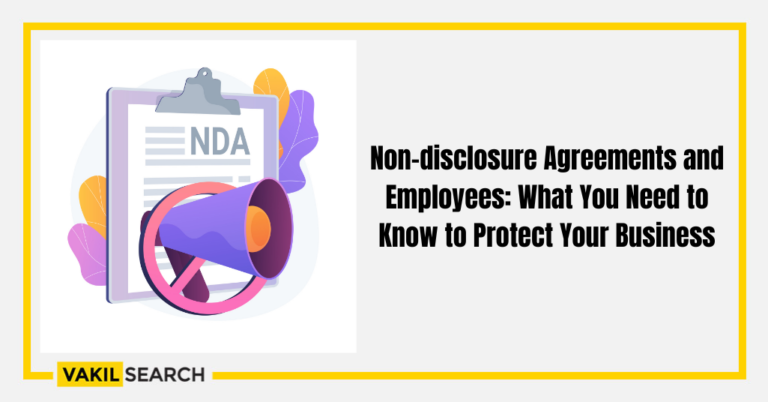In this post, know about a Non-disclosure Pact for Workforce, when it can be used, what should it cover and Employee’s Confidential Information.
Before starting any work for the team, an individual is usually asked to sign a non-disclosure contract. Its main objective is to make prospective candidates and staff aware that they are legally prevented from discussing corporate private information without authorization. This article is about Non-Disclosure Agreement With Current Employees.
It is usually included in a new way of working as part of the induction programme, along with information regarding remuneration, perks, and healthcare.
A non-disclosure contract should be obtained before the individual begins working in the industry, according to experts. Recruiters use provisions from the Safeguard Business Techniques and Practices Law in their agreements. this could include information about legal expenses and compensatory damage.
In order to provide a corporation with very broad coverage, it’s crucial to include technical wording in an Agreement.
It’s also a good idea to include provisions stating that everything created by a worker while in the workplace belongs to the firm. This could also entail the creation of any confidential data or processes.
To integrate or exclude certain clauses that are pertinent to your needs, consult a legal expert. A business or patented invention expert can assist you in identifying your requirements and drafting a non-disclosure agreement that is satisfactory to both parties.
Information that should not be Disclosed Under NDA
Employee data, such as remuneration, job responsibilities, employee information, and annual performance data, is also kept secure.
Data that is shared with potential workers, vendors, subcontractors, advisors, related group firms, etc but not with the wider populace might be termed sensitive. In other words, any information that, if released publicly or shared with other businesses, could harm a corporation can be considered confidential information.
Relevant information about a firm’s products and services is also subject to strict privacy rules. It includes:
- Code for software
- Product expertise
- development of products
- Tutorials or Gadgets
- Memorandums and scientific communication
- Methods or Patterns
- Projects of research
- Research outcomes
- Discoveries or Mechanisms
- Information on the firm’s expenditures
- Information on revenue
- Financial or accounting documents that have not been released
- Earnings and Corporate strategy
- Details of the customer and profiles
- Lists and information about suppliers
- Promotional methods and Procurement methods
Information or commercial secrets owned by other companies or consumers might likewise be considered secret. A non-disclosure agreement may provide that a worker will not reveal this information to the firm, use them in the ordinary course of business, or cause the company to use them. People are not allowed to reveal or use proprietary information from other firms in their present job. You can make the NDA Agreement Drafting with the Expert Panel.
When Are Non-Disclosure Contracts Used in Other Situations?
When an employer has to safeguard secret or privileged data, a non-disclosure pact can be used in a variety of situations.
When the conditions of the relationship are unclear, such as when pursuing investment, participants may request that another participant enter an Legal Agreement.
Moreover, as a legally enforceable instrument, it gives a corporation remedy if another party later renders confidential business information available to the public.
It’s possible that an Agreement will be requested from a new hire throughout the recruitment process. This is because, during screenings, private data is frequently exchanged with the applicant. It may be nearly hard to have any meaningful talk about career advancement without the restrictions of an Agreement. As a result, an Agreement permits all participants to continue talking with an agreement set of conditions.
A non-disclosure contract is also frequently used to engage in a discussion with a vendor about products, parts, and other confidential information sharing in order to determine if the vendor has the ability and competence to offer the required product. As a result, a corporation will need to use an Agreement when dealing with stock, due care, or any other situation where sensitive information is communicated.
Additionally, anyone assessing secret firm data during due diligence must sign a non-disclosure deal. Accounting professionals, financiers, managerial personnel, advisors, associates, and others fall under this category.
What Should Be Included in a Non-Disclosure Contract?
A NDA can cover a wide range of issues. Each company can determine which components of the tracking and measuring are most important to them.
A non-disclosure contract for this business might encompass the rights to such thoughts and products, for example, in a situation where people come up with fresh ideas and make things once on the workplace. Many businesses take possession of their workers’ inventions and ideas.
What is a Confidentiality and Non-Disclosure Pact for the Workforce?
From product ideas and customer lists to technology and drawings, nearly every company has secret and personal information. In many cases, the release of such secret information could be disastrous for a firm, especially if it slips into the hands of rivals.
In this connected society, information may travel the globe in hours. Simply expressing the need of protecting such information could be beneficial. A confidentiality accord was signed at the start of an Employment contract and informs a potential employee that the company takes privacy seriously.
By signing the agreement, an employee recognizes that disclosing confidential information is a violation of the contractual agreement, an obvious reality with serious consequences.
The existence of the agreement allows the occurrences to be recognized and safeguarded. If a company does not use secrecy, it stands to make a loss.
Understanding Non-Disclosure Agreements (NDAs)
NDAs are like contracts, but for secrets. Just like a contract, an NDA is a legally binding agreement between two or more parties. However, instead of being about the exchange of goods or services, an NDA is about the exchange of confidential information.They keep your private information private.
NDAs can be used to protect a wide range of confidential information, including trade secrets, financial data, and customer lists. When you sign an NDA, you are agreeing not to disclose any of the confidential information that you are privy to.
If you break an NDA, you could get in big trouble. Breaking an NDA is a serious breach of contract. In some cases, it could even be considered a crime. If you are caught breaking an NDA, you could be sued by the other party and you could be ordered to pay damages.
So read the fine print carefully before you sign.
NDAs can be complex documents, so it is important to read them carefully before you sign.
Make sure that you understand exactly what you are agreeing to, and that you are comfortable with the terms of the agreement. And if you’re not sure what something means, ask someone who does.
Vakilsearch lawyers specialize in intellectual property law and can help you understand your rights and obligations under an NDA. If you have any questions about an NDA, don’t be afraid to ask for help.
What is an Employee Non-Disclosure Agreement?
An Employee Non-Disclosure Agreement (NDA) is a legal contract between an employer and an employee that prohibits the employee from disclosing confidential information about the employer’s business, products, or services to third parties. The purpose of an Employee NDA is to protect the employer’s trade secrets, proprietary information, and other confidential information from being shared with competitors or the public.
How Enforceable is a Non-Disclosure Agreement?
The enforceability of an NDA depends on several factors, including the specific terms of the agreement, the jurisdiction in which it was signed, and the circumstances surrounding the disclosure of confidential information.
Generally, NDAs are enforceable if they are reasonable in scope, duration, and geographic area, and if they are supported by adequate consideration (i.e., something of value given in exchange for the employee’s promise to keep the information confidential).
Types of Non-Disclosure Agreements
There are two primary types of Non-Disclosure Agreements (NDAs): unilateral and mutual.
- Unilateral NDA: This is a one-way agreement where only one party (typically the employer or the disclosing party) shares confidential information with the other party (usually the employee or the recipient). The recipient agrees to keep the disclosed information confidential and not disclose it to any third party.
- Mutual NDA: This is a two-way agreement where both parties involved (both the employer and the employee or any two parties) disclose confidential information to each other. Both parties agree to keep the information they receive confidential and not share it with any third party.
The choice between a unilateral and mutual NDA depends on the specific situation and the nature of the confidential information being exchanged between the parties. In some cases, only one party may be disclosing sensitive information, making a unilateral NDA more appropriate. On the other hand, if both parties are sharing confidential information, a mutual NDA ensures that both sides are equally bound to protect each other’s sensitive data.
Advantages and Disadvantages of Having an NDA
Employers can benefit from having a Non-Disclosure Agreement (NDA) in place for various reasons, including:
- Protecting Trade Secrets and Confidential Information: An NDA ensures that employees or business partners cannot disclose sensitive company information, proprietary technology, or trade secrets to unauthorized individuals or competitors.
- Maintaining Competitive Advantage: By safeguarding confidential information, employers can maintain a competitive edge in the market and prevent competitors from gaining access to critical business strategies.
- Preventing Information Sharing with Competitors: An NDA restricts employees from sharing confidential information with competitors, reducing the risk of potential harm to the company’s market position.
However, there are also disadvantages to consider when implementing an NDA:
- Legal Costs: Enforcing an NDA may involve legal expenses, especially if a breach of the agreement occurs, which could potentially outweigh the benefits of the protection.
- Deterring Potential Employees: Requiring potential employees to sign an NDA before joining the company may discourage some candidates from accepting job offers, as they might be hesitant to agree to restrictive terms.
- Negative Publicity: Overly restrictive or unfair NDAs can lead to negative publicity and harm the company’s reputation, potentially affecting its ability to attract top talent and secure business partnerships.
Balancing the advantages and disadvantages of an NDA is essential for employers to protect their confidential information effectively while maintaining a positive and competitive work environment.
What are some benefits of NDAs for employers
Some benefits of NDAs for employers include:
- Protection of confidential information: NDAs can help employers protect their trade secrets and other confidential information from being shared with competitors or the public.
- Protection of competitive advantage: By keeping their confidential information secret, employers can maintain a competitive advantage over their competitors.
- Bar on sharing sensitive information: NDAs can prevent employees from sharing sensitive information with competitors, which can help prevent the loss of business or customers.
- Innovation: NDAs can encourage innovation by allowing employers to share confidential information with employees without fear of it being shared with others.
Conclusion:-
A basic contract used with new recruits is the Worker Non-Disclosure Contract. When starting a new commercial partnership with any entity, organizations constantly feel the urge in safeguarding their sensitive information and company secrets.
A set of definitions for privacy, interactions, and conduct will be laid forth here to help a staff knows what is and is not appropriate. This form can be regarded as a signed contract after it is asked to sign.
That is, any breach of its provisions by a signatory party can result in the consequences set forth in it, in addition to and separate from any measures undertaken by a government institution. As a result, it is critical that everyone who is obligated to execute this agreement is completely aware of its provisions.
If you want your people of the organization to adhere to the provisions of a non-disclosure pact, you could consider giving them something more valuable than their current salary. This is about Non-Disclosure Agreement Current Employees.
In addition to the non-disclosure contract, many companies include an all-encompassing job language accord in the contract. This phrase could include responsibilities, pay, and other critical topics.
FAQs
Is a non-disclosure agreement for employees legal?
Yes, a non-disclosure agreement (NDA) for employees is legal and commonly used in various industries to protect sensitive information and trade secrets. It is a legally binding contract between an employer and an employee that prohibits the employee from disclosing confidential information to third parties during and even after their employment. For assistance with drafting an NDA, you can consult Vakilsearch, a trusted platform offering legal services.
Can anyone use a non-disclosure agreement?
Yes, non-disclosure agreements are not limited to businesses; individuals and organizations can use them too. They are versatile and applicable in various situations where confidentiality is vital. Whether you are a freelancer, startup founder, or part of a corporation, you can seek professional help from Vakilsearch to create an NDA tailored to your specific needs.
When should you not use an NDA?
Non-disclosure agreements may not be suitable in certain situations, such as when sharing information that is already publicly available or when disclosure is legally required. Additionally, NDAs should not be used to hide illegal activities or to suppress whistleblowing. For legal guidance on when to use or avoid NDAs, consult Vakilsearch, a reliable platform providing legal solutions.
What are the exceptions to non-disclosure agreements?
While non-disclosure agreements are powerful tools for protecting confidential information, they may have exceptions. Some common exceptions include information already in the public domain, information independently developed by the receiving party, and disclosure compelled by law or court order. To understand the exceptions relevant to your specific case, Vakilsearch can offer expert legal advice.
What is a non-disclosure policy for employees?
A non-disclosure policy for employees outlines the company's expectations and guidelines regarding the handling of confidential information. It helps create a culture of trust and confidentiality within the organization. Vakilsearch can assist in crafting an effective non-disclosure policy to safeguard your company's sensitive data and trade secrets.
What is an employee who signs a nondisclosure agreement?
An employee who signs a non-disclosure agreement agrees to keep confidential information private and refrain from sharing it with unauthorized parties. For professionally drafted non-disclosure agreements, Vakilsearch is your go-to legal partner.
What are the 2 types of non-disclosure agreement?
The two primary types of non-disclosure agreements are unilateral NDAs and mutual NDAs. In a unilateral NDA, only one party discloses confidential information to the other, while in a mutual NDA, both parties exchange confidential information and agree to keep it private. Vakilsearch can help you choose the most appropriate NDA type for your specific situation.
What are the limitations on NDAs?
While NDAs offer valuable protection, they do have limitations. They cannot prevent employees from reporting illegal activities or whistleblowing. Additionally, if the confidential information becomes publicly known without any fault of the receiving party, the NDA's enforcement may be limited. To understand the limitations of an NDA in your context, consult Vakilsearch for expert legal advice and solutions.
Read More:-









